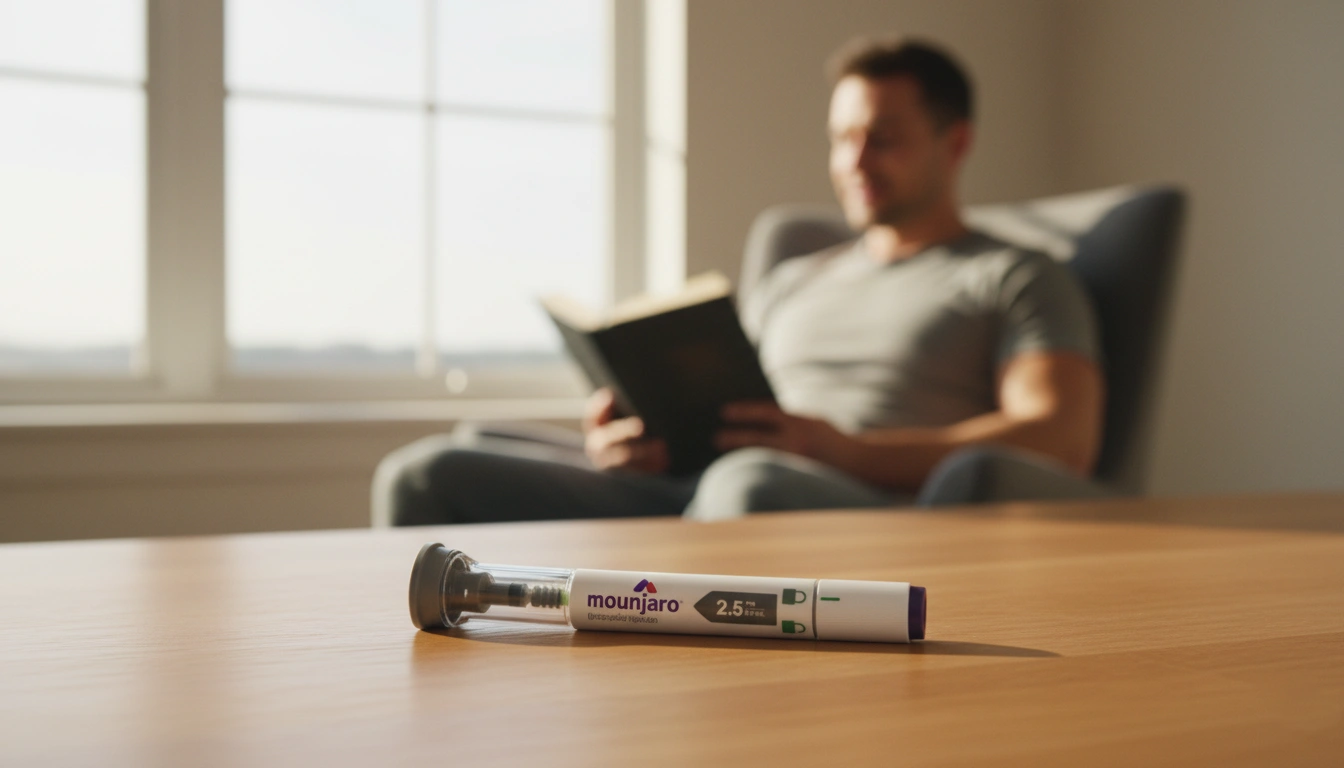How to Not Regain Weight After Mounjaro

Introduction
It’s a common scenario: after months of dedication and effort, you finally achieve your weight loss goals with the help of a medication like Mounjaro. The thrill of success is intoxicating, but what happens when you stop taking the medication? It’s a question that many individuals ponder as they transition from a medically supported weight loss regimen to self-managed maintenance. Research shows that a significant number of people experience weight regain after discontinuing Mounjaro, with studies indicating that individuals can regain up to 14% of their lost body weight.
At TrimRx, we understand the complexities surrounding weight management and the challenges that arise after ceasing medication. Our journey began with a shared vision to empower individuals to embrace healthier lifestyles through personalized, medically supervised care. We believe that sustainable weight loss should be achieved through science, empathy, and a transparent approach, which is why we are here to guide you through this transition.
In this blog post, we will explore practical strategies to help you maintain your weight loss after stopping Mounjaro. We will cover the physiological changes your body undergoes when discontinuing the medication, the importance of lifestyle modifications, and how to leverage the knowledge gained during your treatment to create lasting habits. By the end of this article, you’ll have a comprehensive understanding of how to achieve lasting weight management, even without the aid of Mounjaro.
Understanding Mounjaro and Its Impact on Weight
Mounjaro is an injectable medication containing tirzepatide, which mimics the action of two hormones—GLP-1 and GIP—that play critical roles in appetite regulation and glucose metabolism. By enhancing feelings of fullness and regulating hunger signals, Mounjaro helps users reduce their food intake and manage their weight effectively. Clinical trials demonstrate that participants can achieve significant weight loss, with an average reduction of approximately 22.5% over a 72-week period.
However, when treatment is discontinued, the body’s hormonal balance shifts, leading to increased appetite and the potential for weight regain. This is a reality that many individuals face, as they may revert to dietary habits and lifestyles that contributed to their weight gain before beginning treatment. The challenge lies in maintaining the healthy behaviors established during treatment to prevent this rebound effect.
Physiological Changes After Stopping Mounjaro
When you stop taking Mounjaro, the levels of GLP-1 and GIP in your body decrease, which can lead to heightened hunger and cravings. Research indicates that without ongoing lifestyle changes, the likelihood of regaining weight increases. This is primarily due to the body reverting to its pre-treatment state, where the appetite-regulating mechanisms are less effective.
Understanding these physiological changes is crucial in devising a strategy to maintain weight loss. Here are some key points to consider:
- Hormonal Fluctuations: The decrease in GLP-1 and GIP signals can cause an uptick in hunger, making it essential to be mindful of food intake.
- Metabolic Adjustments: Your metabolism may adjust to the absence of medication, impacting energy expenditure and appetite regulation.
- Behavioral Patterns: The habits and routines established during treatment are critical for long-term success. If these are not maintained, it can lead to a return to previous eating patterns.
Recognizing these changes is the first step toward developing an effective plan for maintaining your weight loss.
Strategies to Prevent Weight Regain
1. Maintain a Healthy Diet
One of the most effective ways to prevent weight regain is to continue following a balanced, nutritious diet. This involves:
- Focus on Whole Foods: Prioritize whole, unprocessed foods rich in nutrients. These include fruits, vegetables, whole grains, lean proteins, and healthy fats.
- Increase Fiber Intake: Foods high in fiber, such as oats, legumes, and leafy greens, can help you feel fuller for longer, mimicking some of the appetite-suppressing effects of Mounjaro.
- Protein-Rich Meals: Incorporating more protein into your diet can aid in satiety and help maintain muscle mass during weight management. Foods like beans, chicken, and fish are excellent sources.
- Hydration: Staying hydrated is crucial for overall health and can help manage appetite. Drinking water before meals can also reduce hunger.
Transitioning to a sustainable eating plan means avoiding extreme diets or crash diets that are difficult to maintain long-term. Instead, focus on creating a balanced approach that you can adhere to for the long haul.
2. Exercise Regularly
Physical activity plays a vital role in maintaining weight loss. Regular exercise helps burn calories, build muscle, and improve overall health. Here are some tips to integrate exercise into your routine:
- Set Realistic Goals: Aim for at least 150 minutes of moderate aerobic activity each week, as recommended by health authorities. This can include brisk walking, cycling, or swimming.
- Incorporate Strength Training: Resistance exercises help build muscle mass, which can increase metabolism. Aim for strength training exercises at least twice a week.
- Find Activities You Enjoy: Whether it’s dancing, hiking, or yoga, engaging in activities you love will help you stay active and motivated.
Regular physical activity not only supports weight maintenance but also enhances mental well-being, which is essential during your transition away from medication.
3. Address Underlying Behavioral Patterns
Understanding the psychological and emotional factors that contribute to eating habits is vital for long-term weight maintenance. Here’s how to address these:
- Mindful Eating: Practice mindfulness by paying attention to your hunger cues, emotions, and eating habits. This can help you make more conscious food choices.
- Identify Triggers: Keep a journal to identify emotional or environmental triggers that lead to overeating. This awareness can empower you to make healthier choices.
- Seek Support: Consider working with a registered dietitian or joining a support group. Having a support system can provide accountability and encouragement during challenging times.
By addressing the underlying causes of overeating, you can develop healthier relationships with food and foster lasting behavioral changes.
4. Set Realistic Goals
Setting achievable goals is essential for maintaining motivation and preventing feelings of overwhelm. Here’s how to approach goal-setting:
- Break Down Goals: Divide larger goals into smaller, manageable milestones. For example, aim to maintain a specific weight for a month before setting a new target.
- Celebrate Achievements: Acknowledge and celebrate your successes, no matter how small. This positive reinforcement can keep you motivated.
- Stay Flexible: Recognize that weight management is a journey, and it’s normal to experience fluctuations. Be kind to yourself and adjust your goals as needed.
By setting realistic and attainable goals, you can create a sustainable path for weight maintenance that aligns with your lifestyle.
5. Utilize TrimRx’s Personalized Support
At TrimRx, we are dedicated to providing you with comprehensive, personalized weight loss solutions. Our approach combines advanced medical science with compassionate care. If you’re seeking additional support in your journey, consider taking our free assessment quiz. This quiz can help determine your eligibility for our personalized weight loss programs, including medications like Semaglutide and Tirzepatide, which may assist in your ongoing weight management efforts.
Conclusion
Achieving weight loss with Mounjaro is a significant accomplishment, but maintaining that weight loss after discontinuation can be challenging. By understanding the physiological changes that occur when stopping the medication and implementing strategic lifestyle modifications, you can minimize the risk of regaining weight.
At TrimRx, we believe that sustainable weight management is about more than just medication—it’s about developing healthy habits and a supportive environment aligned with your unique journey. Together, we can navigate the transition away from Mounjaro and empower you to embrace a healthier lifestyle.
If you’re ready to take the next step in your weight management journey, we encourage you to explore our personalized assessment quiz. Additionally, if you’re looking for immediate support, consider our quick-access supplements like GLP-1 Daily Support and Weight Loss Boost to complement your healthy habits as you maintain your weight loss.
FAQ
How long does it take to regain weight after stopping Mounjaro?
Weight regain can begin as soon as a few weeks after discontinuation, especially if lifestyle changes are not made. Studies show that individuals can regain up to 14% of their lost weight within a year.
What are some effective dietary changes to make after stopping Mounjaro?
Focusing on whole foods, increasing fiber and protein intake, and avoiding ultra-processed foods can significantly aid in weight maintenance.
Can exercise help prevent weight regain after stopping Mounjaro?
Yes, regular physical activity is crucial for maintaining weight loss. It helps increase energy expenditure and supports muscle retention, which can prevent weight regain.
How can I address emotional eating after stopping Mounjaro?
Practicing mindful eating, identifying triggers, and seeking support from professionals can help you manage emotional eating effectively.
Is it necessary to continue weight loss medications after stopping Mounjaro?
While some individuals may benefit from continued medication under medical supervision, others can successfully maintain weight loss through lifestyle changes. It’s essential to discuss your options with a healthcare provider.

Transforming Lives, One Step at a Time
Keep reading
Mounjaro First Month Results: What to Expect
During your first month on Mounjaro (tirzepatide), expect modest but meaningful weight loss. Clinical trial data from the SURMOUNT-1 study shows that participants lost…
Mounjaro 3 Month Results: What to Expect
After three months on Mounjaro (tirzepatide), most people lose between 4% and 7% of their starting body weight. Clinical trial data from the SURMOUNT-1…
Mounjaro Weight Loss Results: Clinical Data and Real Outcomes
Mounjaro has become the most talked-about weight loss medication for a reason: the results are unprecedented. Clinical trials show average weight loss of 22.5%…



